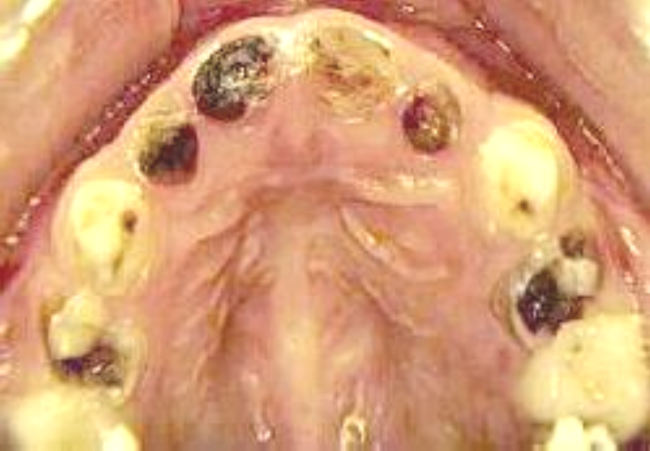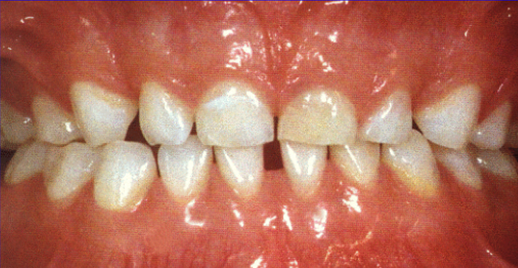BABY TEETH ARE IMPORTANT!
Commonly parents ask,
Why should we worry about cavities in baby teeth when these teeth will be replaced by permanent teeth later?
The answer is that baby teeth serve important functions. Neglect of baby teeth can cause severe problems. Consequently, it is important to make sure that even these “temporary” baby teeth remain healthy and cavity free.
Healthy baby teeth are crucial in helping the baby learn how to speak properly.
Healthy and nice looking teeth are important in building self-confidence and self-esteem. This is especially important at such an early age. Unfortunately, small children can be cruel to one another quick to tease peers about ugly looking or decayed teeth. Furthermore, bad breath resulting from poor dental hygiene can make your child an outcast among peers.
Baby teeth serve as spacers which maintain the proper spacing and alignment of the teeth so that permanent teeth have enough room to come in.
Baby teeth are important in proper feeding and nutrition. A recent study has illustrated a potential link between the number of cavities a child has and the probability of the child being underweight.
BIRTH TO SIX MONTHS
- Clean mouth with gauze after feedings and at bedtime.
- Ask us about fluoride supplements.
- Develop the proper feeding habits to prevent “ Nursing or Baby Bottle Caries”
- If you notice your child beginning to suck their fingers or thumbs, during the first 3 months of life, you can introduce your child to a pacifier. When not eating, the pacifier is better to use for soothing than a finger/thumb or a toy.
Baby Bottle Caries
“Baby bottle caries” (or “nursing bottle caries”) refers to a pattern of tooth decay which occurs in the teeth of infants and preschoolers who are allowed to nurse from a bottle containing a sugary beverage either frequently or for prolonged periods of time (such as while napping or sleeping at night). Baby bottle caries is also observed in those infants who are breast fed frequently throughout the night. Baby Bottle Decay can be completely avoidable
- Never allow your child to nurse for prolonged periods or fall asleep with a bottle containing a beverage, which contains sugars. This includes Fruit juices, Breast milk, milk and formula.
- if you must give them a bedtime bottle use only water inside the bottle.
- After every bottle feeding you take a wet cloth or gauze pad and gently wipe your child’s gums and teeth. This will remove any bacteria containing plaque and excess sugar that may have built up.
- Never give your baby a pacifier dipped in any type of substance containing large amounts of sugar.

Pacifiers
Pacifiers are less likely to cause a malocclusion and are usually discontinued at an earlier age than is thumb sucking. It is easier to take away a pacifier then a finger or thumb. Thumb suckers typically continue the habit until 3-5 years.
- To avoid any trauma to the gums, it’s important to buy a pacifier with a nipple made of rubber
- do not use the soother around the clock, only when necessary
- in rare instances, pacifiers may cause complications, like abnormal swallowing patterns
- check the pacifier daily for breakage. They do not last forever. The child could suck a “ripped” pacifier and choke on it
- do not hang the pacifier around your baby’s neck with a string. Your baby could be accidentally strangled
- to avoid improper breathing and abnormal molding of the baby’s jaws, choose a soother that resembles the natural nipple and breast
- Pacifier use can cause abnormal development of the jaws and teeth.
Some reasons are:
- improperly sized and shaped soother
- strength of sucking action
- length of time the soother is present within the mouth
Most children should grow out of thumbsucking and pacifier use by age 3 or 4. As long as the habit is discontinued before their permanent teeth come in (around ages 4-5) your child will be fine. If, however, they continue this habit as their permanent teeth come in it is best to help your child discontinue their habit.
The most effective way to accomplish this is to simply explain to your child that they must do so in order for their teeth to come in straight. You would be surprised at how effective simply explaining this to your child can be. When they do suck their thumb or use a pacifier give them a gentle verbal reminder.
Under no circumstances should you give negative reinforcement or punish a child for this behavior as this often causes the child to further embrace the habit. Many professionals urge parents to tape their children’s fingers or apply bitter tasting solutions to the fingers to prevent thumbsucking. We would advise against this. It is somewhat cruel and is not as effective as providing positive reinforcement What should you do if your child is having trouble giving up the pacifier or thumbsucking ? We suggest gradually weaning your child. First start by not allowing them to suck their thumb or use a pacifier during certain hours of the day.
Offer them rewards when they successfully do this. Also, since thumbsucking and pacifier use are often security mechanisms, consider giving them a teddy bear, a blanket, or lots of hugs to, in effect, replace the pacifier or thumbsucking.
Gradually increase the number of hours in which they are not allowed to use the pacifier or suck their thumb until they no longer need these habits. Remember, the time they need the pacifier the most (during bed) should be the last time period phased out.

